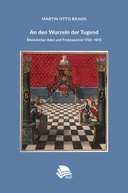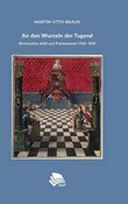Explore

An den Wurzeln der Tugend: Rheinischer Adel und Freimaurerei 1765–1815
Martin Braun Otto
2016
Welche Rolle spielte das »Esoterische« für die Selbstsicht der adlig-bürgerlichen Eliten beim Übergang zur Moderne? Dieser Frage geht die Studie Martin Otto Brauns mit dem Titel »An den Wurzeln der Tugend. Rheinischer Adel und Freimaurerei 1765–1815« nach. Auf der Grundlage der mythischen Geschichtskonstruktionen von Genealogien des rheinischen Adels sowie des Geheimbunds der Freimaurerei zeichnet der Autor die parallel zu den Entwicklungen der Naturwissenschaften verlaufende Transformation der Vorstellung vom tugendhaften »Adel des Blutes« hin zum bürgerlichen »Adel des Intellekts« nach. Die Studie kann dabei zeigen, wie der esoterische Gehalt des frühneuzeitlichen Bildes von Wachstum und Fortschritt des Familienstammbaums sich um 1800 mehr und mehr auf die Konzepte »Nation« und »Volk« im Gesamten ausweitete. Das esoterische Denken hielt sich auf dieser Grundlage bis in die Moderne und sollte vorhandene rassische Vorstellungen adlig-bürgerlicher Eliten der »Sattelzeit« nachhaltig prägen.Martin Otto Braun promovierte im Fach Neuere und Mittelalterliche Geschichte an der Universität zu Köln und war Doktorand in der Forschergruppe »Aufbruch in die Moderne. Der Rheinische Adel in westeuropäischer Perspektive 1750–1850« des Deutschen Historischen Instituts Paris unter Leitung von Prof. Dr. Gudrun Gersmann. Er ist Autor und Mitherausgeber der durch die Fritz Thyssen Stiftung geförderten »Netzbiografie: Joseph zu Salm-Reifferscheidt-Dyck (1773–1861)«.Er veröffentlicht Beiträge zu seiner Forschung in den Blogs »EsoHist. A blogged history of esotericism and secret societies« (Facebook: EsoHist), »Rheinischer Adel« und »Napoleon auf der Spur«.Webseite: http://uni-koeln.academia.edu/MBraun
This book is included in DOAB.
Why read this book? Have your say.
You must be logged in to comment.
Rights Information
Are you the author or publisher of this work? If so, you can claim it as yours by registering as an Unglue.it rights holder.Downloads
- 90 - mobi (CC BY) at Unglue.it.
- 80 - epub (CC BY) at Unglue.it.
- 86 - pdf (CC BY) at Unglue.it.
Keywords
- 1945
- Adel
- Biography & True Stories
- Biography: general
- Biography: science, technology & medicine
- Esoterik
- Esoterism
- European History
- Freemasonry
- Freimaurerei
- Geschichte
- geschichte 1760
- Geschichte 1760–1945
- History
- History 1760-1945
- History: earliest times to present day
- History: specific events & topics
- Humanities
- Modern history to 20th century: c 1700 to c 1900
- Nobility
- Paris
- Racial ideology
- Rassenideologie
- Regional & national history
- thema EDItEUR::3 Time period qualifiers::3M c 1500 onwards to present day
- thema EDItEUR::D Biography, Literature and Literary studies::D Biography, Literature and Literary studies::DN Biography and non-fiction prose
- thema EDItEUR::D Biography, Literature and Literary studies::DN Biography and non-fiction prose::DNB Biography: general
- thema EDItEUR::D Biography, Literature and Literary studies::DN Biography and non-fiction prose::DNB Biography: general::DNBT Biography: science, technology and medicine
- thema EDItEUR::N History and Archaeology
- thema EDItEUR::N History and Archaeology::NH History
- thema EDItEUR::N History and Archaeology::NH History::NHD European history
- thema EDItEUR::N History and Archaeology::NH History::NHT History: specific events and topics
Links
DOI: 10.16994/baaweb: http://www.humanities-map.net/site/books/10.16994/baa/
Editions




